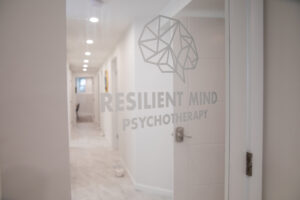Rational Emotive Behavioral Therapy with Resilient Mind
At Resilient Mind Psychotherapy, we believe that emotional well-being starts with the way we think. That’s why we’re proud to offer Rational Emotive Behavioral Therapy (REBT)—a powerful, evidence-based approach to mental health that helps you change the beliefs and thought patterns that fuel anxiety, depression, and stress.
Whether you’re facing daily worries or deeply rooted emotional struggles, REBT therapy can help you build lasting resilience from within.
What Is REBT Therapy?

REBT therapy stands for Rational Emotive Behavioral Therapy, a form of cognitive-behavioral therapy developed by psychologist Albert Ellis in the 1950s. At its core, REBT is based on the idea that it’s not events themselves that disturb us—but our beliefs about those events.
Rather than focusing only on symptoms, REBT helps individuals identify and challenge irrational thoughts and replace them with more constructive, rational perspectives. This shift leads to healthier emotional reactions and more effective behaviors.
Unlike traditional talk therapy, which may focus heavily on the past, REBT is an active, solution-oriented treatment. Clients work collaboratively with the therapist to identify unhelpful beliefs, question them, and learn how to respond in new ways.





Contact us today for a free consultation and start your journey to a more resilient mind.
REBT Therapy vs. CBT: What’s the Difference?
A common question we hear is: What is REBT therapy vs CBT (Cognitive Behavioral Therapy)?
While both REBT and CBT share similar roots and strategies, there are some important differences:
CBT focuses on identifying and changing distorted thinking patterns and behaviors. It often addresses automatic thoughts that arise in specific situations.
REBT, on the other hand, dives deeper into core irrational beliefs, such as “I must be perfect” or “I can’t stand it when things go wrong.” It emphasizes the importance of acceptance, emotional responsibility, and long-term philosophical change.
In short: CBT helps you manage how you think, while REBT helps you change what you believe. At Resilient Mind Psychotherapy, we offer both approaches—tailored to your individual needs.
How REBT Helps You Break the Cycle
Many of our clients come to us feeling overwhelmed by negative emotions—worry, frustration, guilt, or hopelessness. REBT helps break the cycle by targeting the irrational beliefs that fuel those feelings.
Common Irrational Beliefs REBT Addresses:
“I must be liked by everyone to be okay.”
“If something goes wrong, it’s a catastrophe.”
“I can’t tolerate failure or discomfort.”
“Other people must treat me fairly at all times.”
Through therapy, you’ll learn to replace these with realistic, empowering beliefs—like “I prefer approval, but I don’t need it to be okay” or “It’s disappointing, but not unbearable.”
Who Can Benefit from REBT Therapy?

REBT is a flexible and effective approach for a wide range of emotional and behavioral challenges, including:
Generalized anxiety
Social anxiety and fear of judgment
Panic attacks
Depression
Low self-esteem
Perfectionism and procrastination
Anger management
Relationship difficulties
It’s particularly helpful for people who:
Struggle with rigid thinking or high self-expectations
Feel stuck in emotional loops or self-criticism
Want a practical, results-focused therapy model
Are ready to take an active role in their healing journey
Why Choose Resilient Mind for REBT?
EXCELLENTTrustindex verifies that the original source of the review is Google. I started therapy a few weeks ago with Laura Esquival Martinez. In just a few sessions, she made me feel very comfortable and welcoming. I was able to connect with her in my own peace. Which I appreciate it because it’s hard to open up to a total stranger. We quickly connected and so far is going very well. Thank you Laura for helping, I look forward to continue therapy with you.
Owner's reply
Hey Julia, We are so happy to hear you are having a positive experience working with Laura E. Thank you for sharing!Posted onTrustindex verifies that the original source of the review is Google. professional staff, clean office, great location
Owner's reply
Hey Bogdana, We are happy to hear you have had a positive experience with us. Thanks for sharing!Posted onTrustindex verifies that the original source of the review is Google. Armina is an excellent therapist who brings empathy, professionalism, and insight to every session. She creates a safe and supportive environment where it’s easy to open up and reflect. Her guidance has been thoughtful and effective, and I’m very grateful for the positive impact she’s had on my well-being.
Owner's reply
Hey Iva, We are so happy to hear you are having a positive experience working with Armina. Thanks for sharing 😊Posted onTrustindex verifies that the original source of the review is Google. Staff is friendly, responsive and helpful, I connected quickly with my therapist Tamrah who is beyond words amazing. Would recommend 10/10.
Owner's reply
Hey Jenny, we are so happy to hear you have had such a positive experience with us and thank you for sharing. 😊Posted onTrustindex verifies that the original source of the review is Google. I was very skeptical about the mental health services covered by my insurance, and had a pretty unsatisfying experience trying before. But the services provided by the Resilient Mind made me believe that professionals that care about your well-being, not only about your insurance, do exist. The administration is very polite and organized, they answered all my questions in a timely manner and made sure everything was up to my needs. The therapist I was matched to is beyond my expectations! So attentive, kind and professional. So far, I'm highly satisfied with the work done. If you're in search for qualitative mental health services don't hesitate to try Resilient Mind Psychotherapy!
Owner's reply
Hey Amina, Thank you so much for sharing your experience! We know how discouraging it can be to navigate insurance and find the right support, so it means a lot to hear that you felt cared for and well-matched here. Our team truly strives to make therapy both accessible and deeply personal, and feedback like yours reminds us why we do what we do. We’re so glad you found a therapist who resonates with you — and we’re honored to be part of your journey.Posted onTrustindex verifies that the original source of the review is Google. Alexandra is the best!!
Owner's reply
Thank you for your five-star review! We appreciate your support and are thrilled to hear that you had a positive experience with us. Your satisfaction is our priority, and we look forward to serving you again in the future.Posted onTrustindex verifies that the original source of the review is Google. What a cute therapy place! Take my eldest here for group therapy and highly recommend it to all! Very aesthetic, super friendly neighborhood therapy place where they have an interactive waiting area and reasonable pricing for those looking for therapy:)
Owner's reply
Thank you for your positive review! We're thrilled to hear that you had a great experience with us. Your support means a lot, and we look forward to serving you again in the future.Posted onTrustindex verifies that the original source of the review is Google. Resilient Mind Psychotherapy has been accommodating and attentive to all my needs. My provider, Sean Reap, is easily the best therapist I have had the pleasure of working with in the past 10 years.
Owner's reply
Thank you for your wonderful feedback, Matt. We're thrilled to hear that Sean has made such a positive impact on your therapy experience. At Resilient Mind Psychotherapy, we strive to provide personalized care, and it's great to know that we're meeting your needs effectively. Your support means a lot to us!
Our team at Resilient Mind Psychotherapy brings warmth, experience, and clinical skill to every session. When you choose us for REBT therapy in Brooklyn, you’re choosing:
Licensed therapists trained in CBT, REBT, and trauma-informed care
A collaborative, nonjudgmental environment
Customized treatment plans based on your goals
Options for in-person or online therapy sessions
We work with children, teens, and adults across Brooklyn and throughout New York State through telehealth. Whether you’re new to therapy or looking for a new approach, we’ll meet you exactly where you are.
Therapy That’s Accessible—and Covered
We know mental health care can be a financial concern. That’s why we proudly accept several major insurance providers, making quality therapy more accessible to our community.
We currently accept:
This means you can focus on your healing—not the paperwork. We’ll help you verify your benefits and walk you through the process.
Start Your Journey Toward Rational, Resilient Thinking
If you’ve ever felt trapped by your own thoughts—or frustrated by emotional reactions that feel out of control—REBT therapy offers a way forward. At Resilient Mind Psychotherapy, we believe you have the power to challenge those thoughts, build new habits, and create meaningful change.
You don’t have to stay stuck in unhelpful cycles.
Reach out today to book a session with one of our REBT-trained therapists in Brooklyn. Whether you’re curious about REBT or ready to dive in, we’re here to support your growth—one belief at a time.

FAQs
1. Is REBT therapy suitable for children or teens?
Yes, REBT can be adapted for children and teens, especially those who struggle with anxiety, frustration, or negative self-talk. At Resilient Mind Psychotherapy, our therapists use developmentally appropriate techniques to help younger clients identify their beliefs, emotions, and behaviors—and learn how to challenge unhelpful thinking.
2. What are some common techniques used in REBT therapy?
REBT techniques often include disputing irrational beliefs, practicing emotional acceptance, journaling thought patterns, and using visualization to shift perspectives. Therapists may also assign homework and role-playing exercises to help clients internalize new ways of thinking.
3. Can REBT help with workplace stress or burnout?
Absolutely. REBT is especially useful for professionals experiencing performance anxiety, perfectionism, or people-pleasing tendencies. By addressing the core beliefs that lead to stress—such as “I must never make a mistake”—clients learn healthier ways to manage pressure and maintain emotional balance.
4. Is REBT therapy religious or spiritual in nature?
No, REBT is a secular and evidence-based form of psychotherapy. While it emphasizes personal growth and acceptance, it does not rely on any religious or spiritual beliefs. However, therapists at Resilient Mind are always respectful of your values and can integrate your worldview into therapy if you choose.
5. What makes REBT different from positive affirmations or self-help advice?
Unlike surface-level affirmations, REBT works at the root level—addressing deeply ingrained belief systems that fuel emotional distress. It’s not about repeating “I’m fine” until you believe it—it’s about understanding why you don’t feel fine in the first place, and challenging the beliefs that are keeping you stuck.